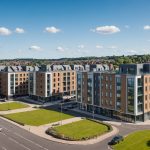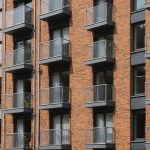Overview of Smart City Technologies in Sheffield
Smart city technologies in Sheffield are reshaping urban landscapes through urban innovation. These technologies efficiently address complex urban challenges, making cities not only more sustainable but also enhancing the quality of life for residents. Central to these innovations, Sheffield is integrating comprehensive approaches to smart living.
The current landscape of housing developments in Sheffield showcases a commitment to sustainable and intelligent growth. These developments leverage cutting-edge technology to optimize residential areas, improve energy efficiency, and promote a sense of community. Several projects highlight Sheffield’s forward-thinking approach in embracing smart city technologies to meet urban demands.
Additional reading : Unpacking the impact of the gig economy on flexible office space demand in the uk
Key stakeholders involved are pivotal to the success of these initiatives. Local government bodies, private sector developers, tech companies, and community organizations are collaboratively driving the vision of a smart city forward. Their combined efforts ensure that technological advancements are effectively implemented within housing developments.
Understanding and utilising urban innovation is vital for dealing with the complexities of modern urbanisation. As Sheffield continues to adopt and expand smart city projects, the synergy between these stakeholders will significantly influence the city’s future urban development and sustainability.
Also to see : Navigating Post-COVID Tenant Evictions in the UK: A Comprehensive Landlord’s Guide to the New Legal Terrain
Integration of Technology in Housing Developments
The integration of technology within housing developments is redefining how residents experience urban living. It seamlessly combines efficiency, sustainability, and smart living to create improved environments.
Automation and IoT in Homes
Home automation systems, empowered by the Internet of Things (IoT), offer numerous benefits. They provide convenience, allowing residents to control appliances with precision, enhancing energy efficiency through smart monitoring. IoT platforms like Zigbee are instrumental in integrating various devices, streamlining overall home management. This results in reduced energy consumption, economical savings, and a more comfortable living experience.
Renewable Energy Solutions
Embracing renewable energy within housing developments is crucial for sustainability. Implementing solar panels and small-scale wind turbines significantly cuts carbon footprints and lowers energy costs. Notable examples include housing projects where renewable solutions have effectively reduced utility bills and contributed to environmental goals, making urban areas greener.
Data-Driven Urban Planning
Big data plays a transformative role in urban planning, driving decisions that improve the resident experience. By analysing data, urban developers can optimise resources, anticipate future needs, and enhance the quality of life. Emerging trends suggest a shift towards even more data-centric approaches, promising smarter, responsive urban environments.
Case Studies of Smart Housing Projects in Sheffield
Sheffield is at the forefront of groundbreaking smart housing projects, revolutionizing urban technology application. A notable case study is the Park Hill development, which integrates smart city technologies to enhance sustainability and urban innovation. This project uses energy-efficient systems and promotes community connectivity through integrated IoT solutions.
The Kelham Island initiative is another example showcasing innovative developments. It features cutting-edge technology for energy generation and waste management, promoting environmentally friendly urban living. The incorporation of solar panels and rainwater harvesting systems reflects Sheffield’s commitment to renewable energy.
Successful outcomes from these projects owe much to strategic partnerships among local councils, developers, tech firms, and community groups. These collaborations ensure projects align with smart housing goals while addressing residents’ needs and challenges. Identifying these key success factors is essential for transferring lessons to future developments.
However, these projects also faced hurdles, such as technological integration costs and resident engagement. Overcoming these challenges provides valuable insight for cities on a similar track, emphasizing the importance of adaptive approaches and continuous innovation in smart housing projects.
Benefits of Smart City Technologies for Residents
Smart city technologies deliver pivotal resident benefits, enhancing urban living experiences remarkably.
Increased Quality of Life
With innovative smart technologies, residents enjoy significant lifestyle improvements. For example, community engagement is fostered through digital platforms, connecting neighbors and organizing local events effortlessly. Smart surveillance systems amplify safety and security by providing real-time alerts and enhancing situational awareness.
Environmental Sustainability
Smart systems substantially decrease carbon footprints, which is paramount for environmental sustainability. Energy-efficient appliances and intelligent resource management systems in housing estates ensure minimal waste and optimal utilisation. These initiatives enact lasting impacts, aligning urban living with ecological responsibility by promoting green practices.
Economic Advantages
The economic benefits of smart city technologies are profound, with efficient energy management leading to significant cost reductions for residents. Smart initiatives spark job creation in tech sectors, further bolstering the local economy. Housing powered by such technologies often experiences an increase in property values, attracting investments and developing vibrant urban communities.
Smart city solutions are not mere enhancements but transformative elements of modern urbanity. Residents are empowered to live sustainably, economically sound, and interconnected lives, revolutionising the urban tapestry for the better.
Environmental Impact of Smart Housing Technologies
Smart housing technologies are reshaping urban landscapes with a profound environmental impact, demonstrating the synergy between sustainability and modern living. These technologies significantly reduce energy use, largely through intelligent systems that monitor and optimize consumption. For example, smart meters and energy-efficient devices help maintain ideal energy levels, decreasing reliance on non-renewable resources.
Green spaces and biodiversity play a crucial role in enhancing urban settings. Integrating parks and urban gardens in smart housing promotes ecological balance, offering habitats for various species while also improving air quality. These green havens not only enhance residents’ well-being but also foster a robust urban ecosystem resilient to climate shifts.
Smart housing also contributes to overall urban resilience by promoting sustainable urban development. Through innovative water management systems and sustainable construction materials, these homes withstand environmental challenges more effectively. As cities face growing environmental concerns, such initiatives become indispensable, aligning with broader ecological objectives and ensuring cities remain environmentally viable for future generations.
Future Trends in Smart City Development
Smart city development is poised for remarkable advancements with several future trends shaping the urban landscape. Artificial Intelligence (AI) and machine learning stand to significantly enhance city management, driving systems towards self-optimization through adaptive learning. These technologies can predict and react to urban demands efficiently, enabling smoother traffic flow and better public services.
The arrival of 5G technology will revolutionize connectivity within housing developments, enabling faster and more reliable communication between devices. This low-latency network will enhance real-time data processing and facilitate improved IoT device integration, supporting smart home functionalities.
Equally important is the role of local government in fostering smart city growth. Encouraging initiatives through supportive policies and incentives for developers are crucial steps. Governments need to create robust frameworks that can adapt to rapid technological changes while ensuring security and privacy.
In this evolution, community involvement is imperative. Encouraging residents to participate in planning processes ensures that smart solutions align with their needs and expectations. Innovative engagement strategies might include interactive platforms empowering residents to voice their opinions, fostering an inclusive and collaborative approach to urban development.









